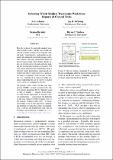| dc.contributor.author | Lehman, Eric | |
| dc.contributor.author | DeYoung, Jay | |
| dc.contributor.author | Barzilay, Regina | |
| dc.contributor.author | Wallace, Byron C | |
| dc.date.accessioned | 2022-08-05T17:29:27Z | |
| dc.date.available | 2021-11-05T11:51:31Z | |
| dc.date.available | 2022-08-05T17:29:27Z | |
| dc.date.issued | 2019 | |
| dc.date.submitted | 2019-06 | |
| dc.identifier.uri | https://hdl.handle.net/1721.1/137427.2 | |
| dc.description.abstract | © 2019 Association for Computational Linguistics How do we know if a particular medical treatment actually works? Ideally one would consult all available evidence from relevant clinical trials. Unfortunately, such results are primarily disseminated in natural language scientific articles, imposing substantial burden on those trying to make sense of them. In this paper, we present a new task and corpus for making this unstructured evidence actionable. The task entails inferring reported findings from a full-text article describing a randomized controlled trial (RCT) with respect to a given intervention, comparator, and outcome of interest, e.g., inferring if an article provides evidence supporting the use of aspirin to reduce risk of stroke, as compared to placebo. We present a new corpus for this task comprising 10,000+ prompts coupled with full-text articles describing RCTs. Results using a suite of models - ranging from heuristic (rule-based) approaches to attentive neural architectures - demonstrate the difficulty of the task, which we believe largely owes to the lengthy, technical input texts. To facilitate further work on this important, challenging problem we make the corpus, documentation, a website and leaderboard, and code for baselines and evaluation available at http://evidence-inference.ebm-nlp.com/. | en_US |
| dc.language.iso | en | |
| dc.publisher | Association for Computational Linguistics | en_US |
| dc.relation.isversionof | 10.18653/V1/N19-1371 | en_US |
| dc.rights | Creative Commons Attribution 4.0 International license | en_US |
| dc.rights.uri | https://creativecommons.org/licenses/by/4.0/ | en_US |
| dc.source | Association for Computational Linguistics | en_US |
| dc.title | Inferring Which Medical Treatments Work from Reports of Clinical Trials | en_US |
| dc.type | Article | en_US |
| dc.identifier.citation | Lehman, Eric, DeYoung, Jay, Barzilay, Regina and Wallace, Byron C. "Inferring Which Medical Treatments Work from Reports of Clinical Trials." NAACL HLT 2019 - 2019 Conference of the North American Chapter of the Association for Computational Linguistics: Human Language Technologies - Proceedings of the Conference, 1. | en_US |
| dc.contributor.department | Massachusetts Institute of Technology. Department of Electrical Engineering and Computer Science | en_US |
| dc.contributor.department | Massachusetts Institute of Technology. Computer Science and Artificial Intelligence Laboratory | en_US |
| dc.relation.journal | NAACL HLT 2019 - 2019 Conference of the North American Chapter of the Association for Computational Linguistics: Human Language Technologies - Proceedings of the Conference | en_US |
| dc.eprint.version | Final published version | en_US |
| dc.type.uri | http://purl.org/eprint/type/ConferencePaper | en_US |
| eprint.status | http://purl.org/eprint/status/NonPeerReviewed | en_US |
| dc.date.updated | 2020-12-01T16:33:17Z | |
| dspace.orderedauthors | Lehman, E; DeYoung, J; Barzilay, R; Wallace, BC | en_US |
| dspace.date.submission | 2020-12-01T16:33:21Z | |
| mit.journal.volume | 1 | en_US |
| mit.license | PUBLISHER_CC | |
| mit.metadata.status | Publication Information Needed | en_US |
